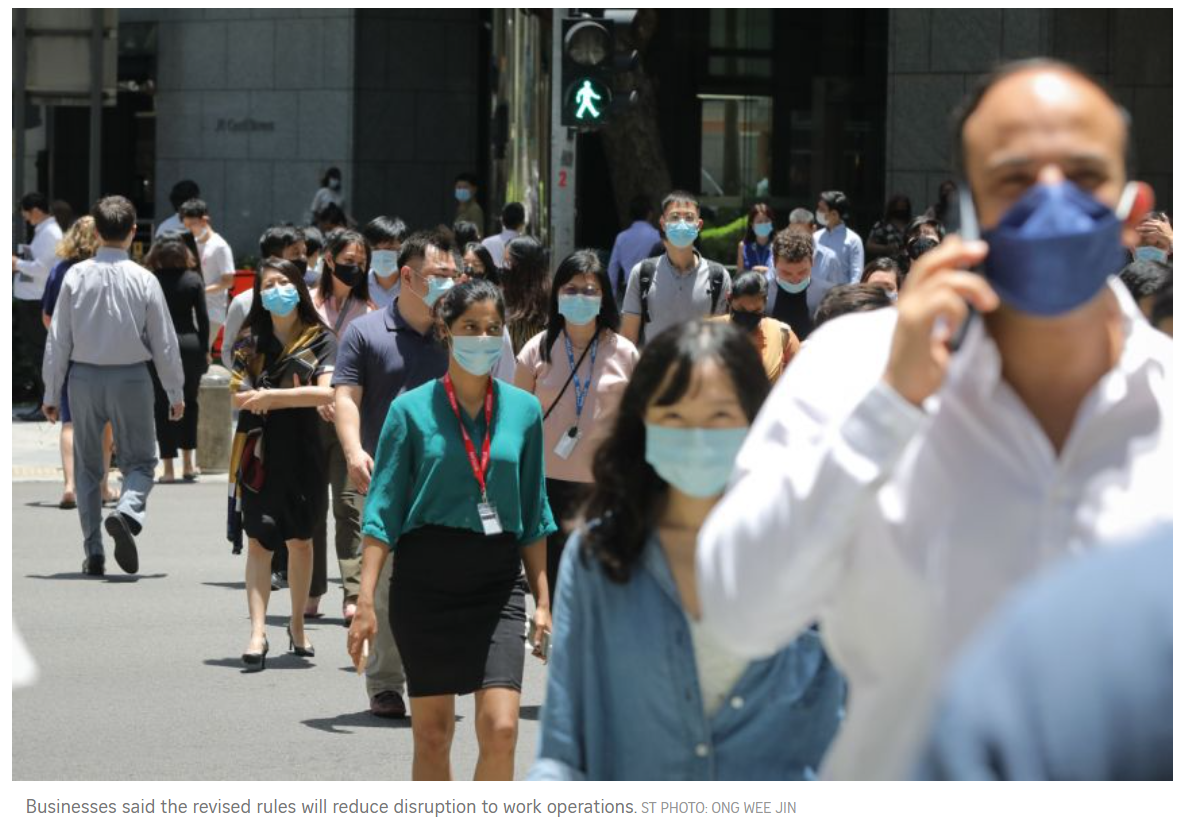Singapore firms welcome revised snap WFH rules, less disruption expected in event of Covid-19 case
SINGAPORE – Businesses welcomed changes to the snap work-from-home (WFH) regime, noting that the revised rules would reduce disruption to work operations should there be Covid-19 cases among employees.
This was after the Ministry of Manpower (MOM) announced several changes to the existing snap WFH regime on Monday (Sept 20).
From Wednesday, such a regime will be implemented only if three or more employees working in the same premises test positive for Covid-19 within a period of seven consecutive days.
The duration of enforced WFH – for workers who are able to work from home – will also be cut to 10 days from the previous 14 days.
Affected workers may return to the office for ad-hoc reasons, if they test negative using an antigen rapid test (ART). The test should be completed before they return, and not done more than 24 hours before the end of their return to the workplace.
Previously, a single Covid-19 case in the workplace meant employers had to require all employees able to WFH to do so for 14 days.
Prudential Singapore head of corporate affairs Tan Ping Ping said the revised rules are a welcome update for businesses, even if the insurance firm’s employees have the necessary tools to transition to snap WFH arrangements if required.
On average, less than 10 per cent of Prudential’s employees work on-site across its three corporate offices daily, she said.
“As an added precaution, front-line employees such as our receptionists and customer service centre employees do a weekly self-test. Antigen rapid test kits are also available for employees who wish to do self-testing for peace of mind,” Ms Tan added.
Mr Blair Crichton, co-founder of plant-based food company Karana, said the revised snap work-from-home regulations are “a step in the right direction” and any relaxation of the regulations is appreciated.
This is especially so as the firm has a lean team in Singapore working on research and development and marketing, and its technical staff need to use the lab equipment on-site, he added.
Since Aug 21, up to 50 per cent of employees who are able to work remotely have been allowed to be at the workplace at any point in time.
Ms Bessie Kum, human resources director for tech firm Acronis in Asia-Pacific and Japan, said the updated policy reflects Singapore’s determination and overall strategy to live with the virus.
“The latest updates still provide security to local companies and employees, but also clearly show that potential business interruptions will be minimised,” she said.
Acronis, which has more than 200 employees here, currently allows only vaccinated staff to go to the office and has less than 20 per cent of employees on-site daily on average.
Telco Singtel said it has familiarised employees with the necessary procedures so they can respond quickly in the event that any of its staff tests positive for Covid-19.
The group’s chief people and sustainability officer Aileen Tan said that employees were previously operating in split teams since the easing of restrictions, but have transitioned back to working from home as the default arrangement since Sept 9, as a precaution.
Split-team arrangements remain for essential employees who need to be on-site, along with a business continuity plan.
“Most of our meetings and events are conducted virtually and our employees are well equipped with digital tools to work from home, thus minimising any impact to our operations. Our staff have also become accustomed to changes and are quick to respond and adapt,” said Ms Tan.
Strides Pharma Global chief executive and managing director Mohan Kumar said that 50 per cent of non-technical staff in his company are working from home at any given time.
Only technicians who are required to run the pharmaceutical factory have to work on-site, and there is no mingling between staff from different departments, he said.
A DHL spokesman said employees whose roles can be performed remotely have been working from home since last year.
The company regularly engages employees through virtual town-hall meetings, and all staff are encouraged to maintain daily interaction with their colleagues through phone or video calls or digital platforms, the spokesman added.
Since the Ministry of Health’s announcement of a cluster at the DHL Supply Chain Advanced Regional Centre, all employees on-site have been undergoing daily ART testing.
Operational staff in impacted teams have undergone additional polymerase chain reaction testing.
The company has also increased the frequency of deep cleaning in facilities and hired additional safety ambassadors to reinforce safe-distancing measures on-site.
Meanwhile, a Lazada spokesman said the company is giving staff the flexibility to decide if they wish to continue to work from home or the office, but those who wish to work from the office must submit an internal daily request to do so.
Lazada’s e-grocer arm Redmart started voluntary fortnightly on-site testing at its fulfilment centre in Jalan Buroh during the phase two (heightened alert) period, and has since increased the frequency of ART testing to weekly.
MOM has said these snap WFH requirements are meant for general workplace settings.
Specific workplaces like construction worksites or shipyards should refer to sector-specific requirements, the ministry added.
For example, an advisory for food and retail outlets found on the GoBusiness site said that employers should focus on providing the facilities necessary and directing every worker to work from home “as far as reasonably practicable”.
“The proportion of employees that can do so will vary in different workplaces and sectors due to differing operational requirements,” it added.
• Additional reporting by Yeo Shu Hui
Source: https://www.straitstimes.com/business/spore-firms-welcome-revised-snap-wfh-rules-less-disruption-expected-in-event-of-covid-19


 Thailand
Thailand




